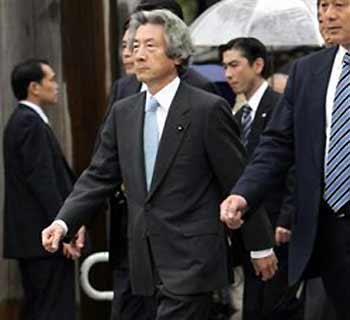|
Japan, China to exchange 2,000 students
(Yomiuri Daily)
Updated: 2006-01-09 08:58
More than 2,000 high school students are to be mutually invited to visit
Japan and China each year as part of efforts to improve bilateral relations,
according to Japanese government sources.

Japanese Prime Minister Junichiro
Koizumi arrives at the Yasukuni Shrine in Tokyo Monday, Oct. 17,
2005.[AP] |
The exchange program, which
is part of mid- and long-term efforts to boost ties, aims to build a
forward-looking relationship. Relations have soured over Prime Minister
Junichiro Koizumi's visits to war-related Yasukuni Shrine.
Officials of the Japanese and Chinese foreign ministries held a working-level
meeting in late December in Beijing to discuss the plan, the sources said.
At the meeting, the Japanese side officially told their Chinese counterparts
that Tokyo would put aside 10 billion yen in a new fund for the exchange program
by February at the earliest, and would start accepting Chinese high schoolers in
September.
In response, Beijing is to shortly start inviting about 1,000 Japanese high
schoolers a year to China.
The Japanese side considers that about 1,100 Chinese students a year will be
invited for short visits of 10 days or so; about 100 on middle-term stays of two
to three months; and about 50 on long stays of a year.
The short stays will be handled by the Japan-China Friendship Center, with
the others to be organized by the planned fund.
It was not decided by the Chinese side whether the exchange program in the
country would be financed by a similar fund or through annual budgetary
expropriations, the sources said.
To encourage personnel exchanges, Tokyo also is considering relaxing
conditions on the issuance of multiple visas to Chinese who visit Japan for the
purpose of business, academic, arts or other activities. With a multiple visa,
the holder can visit Japan as many times as needed during a three-year period.
Japan's multiple visas are issued to a limited number of Chinese, such as
employees of companies belonging to Japanese chambers of commerce and industry,
employees of Chinese state-run corporations, scholars at the level of university
lecturer or higher, and famous artists.
When employees of small companies in China visit Japan, time-consuming
procedures are necessary and their Japanese hosts have to provide guarantees.
A Japanese Foreign Ministry official said, "Japan and China have agreed to
proceed with the exchange program based on a long-term perspective."
Relations between Japan and China have been strained because of the Yasukuni
Shrine issue and a recent diplomatic row caused by the suicide of an official of
the Japanese Consulate General in Shanghai.
Since becoming prime minister, Koizumi has visited the Tokyo shrine every
year. China, along with South Korea, has harshly criticized his worship at the
Shinto shrine for hurting the feelings of people in China and other Asian
countries that suffered from Japan's wartime aggression.
Koizumi has rebutted the criticisms by saying his visits to the shrine are a
personal matter, and that China must refrain from making it a diplomatic row. At
his first press conference for 2006 held Wednesday, Koizumi reiterated his
stance toward China and South Korea over the issue.
|